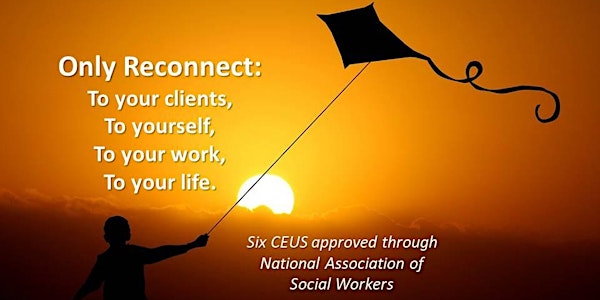Getting Unstuck: Expanding Use of Self in Trauma-informed Practice
Most helpers who work with high-conflict, crisis-prone clients with histories of trauma struggle at some point with feeling "stuck" with what to do. The emotional intensity and complexity of the work can be overwhelming and prevent helpers from seeing creative options as well as their role in the “stuckness.”
The effective use of self is one of the most powerful tools that practitioners deploy in the helping relationship to get unstuck. Most practitioners are exposed early in their education to this idea--the use of self--which includes the strategic use of self-disclosure to deepen the client’s sense of safety as well as the unspoken ways our bodies resonate with the client’s inner experience. Emerging ideas from the field of trauma and interpersonal neurobiology provide another lens for practitioners to consider--perhaps even to re-think--their definition of success, their boundaries, their use of personal stories, and the vital relevance of a personal wellness strategy to clinical success.
BY THE END OF THIS WORKSHOP, using a combination of personal reflection and dialogue, participants will:
-
Review the current wisdom about the use of self within the helping relationship;
-
Apply emerging knowledge about trauma and interpersonal neurobiology to dilemmas in direct practice and to create a personal strategy for getting "unstuck" with challenging clients;
-
Explore the intentional use of self, both autobiographical story and body memory, to identify and neutralize threats related to power differences, mitigate anxiety and uncertainty, and enhance the human experience within the helping relationship; and
-
Use implicit and body memory as a guide to the client’s inner experience as well as to the helper's own self-knowledge and self-care.
Most helpers who work with high-conflict, crisis-prone clients with histories of trauma struggle at some point with feeling "stuck" with what to do. The emotional intensity and complexity of the work can be overwhelming and prevent helpers from seeing creative options as well as their role in the “stuckness.”
The effective use of self is one of the most powerful tools that practitioners deploy in the helping relationship to get unstuck. Most practitioners are exposed early in their education to this idea--the use of self--which includes the strategic use of self-disclosure to deepen the client’s sense of safety as well as the unspoken ways our bodies resonate with the client’s inner experience. Emerging ideas from the field of trauma and interpersonal neurobiology provide another lens for practitioners to consider--perhaps even to re-think--their definition of success, their boundaries, their use of personal stories, and the vital relevance of a personal wellness strategy to clinical success.
BY THE END OF THIS WORKSHOP, using a combination of personal reflection and dialogue, participants will:
-
Review the current wisdom about the use of self within the helping relationship;
-
Apply emerging knowledge about trauma and interpersonal neurobiology to dilemmas in direct practice and to create a personal strategy for getting "unstuck" with challenging clients;
-
Explore the intentional use of self, both autobiographical story and body memory, to identify and neutralize threats related to power differences, mitigate anxiety and uncertainty, and enhance the human experience within the helping relationship; and
-
Use implicit and body memory as a guide to the client’s inner experience as well as to the helper's own self-knowledge and self-care.
